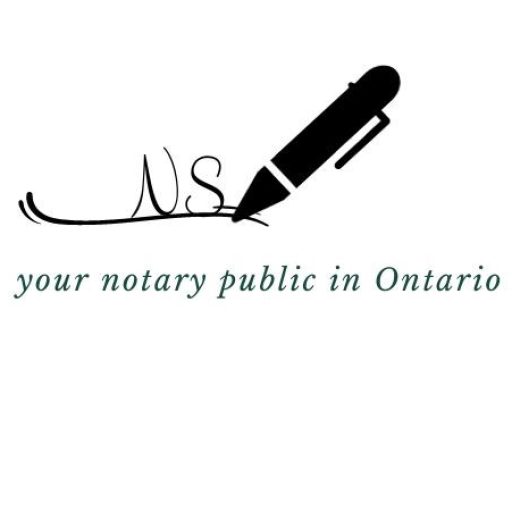Do you intend to use your public documents abroad? This post outlines the actions required before you can use the document abroad.
The first step is always to confirm the requirements of the foreign government or organization. However, in most cases, you may be required to notarize, authenticate and legalize the documents to prove their authenticity.
NotaryServe provides professional notary services for documents intended for international use, helping you notarize and prepare your paperwork correctly to meet foreign requirements. Contact NotaryServe at (613) 558-5363 for assistance.
What is Notarization and Authentication?
Notarization is the process of affixing the seal and signature of a notary public to a document to confirm the document’s validity and/or the identity of the maker/signer. Authentication confirms that the notary’s seal and signature on a legal document are genuine. For documents intended for a country that is a member of the 1961 Hague Apostille Convention, an apostille certificate will be issued instead. This certificate serves the same purpose as an authentication certificate. Legalization involves having your document certified by the embassy, high commission, or consulate of the destination country in Canada, confirming its validity there.
Actions Required to Prepare a Canadian Public Document for Use Abroad
- CONFIRM THE REQUIREMENTS OF THE FOREIGN GOVERNMENT OR INSTITUTION where the documents will be used. Requirements may be confirmed with the foreign organization requesting your documents or the destination country’s embassy, high commission, or consulate in Canada. NotaryServe cannot advise on the requirements of a foreign organization or destination country
- NOTARIZE the document. Visit a Notary Public near you to get the document notarized. You must have the original copy of the document and proof of ID. In addition, please note the following:
- Affidavits, oaths, declarations, affirmations and documents that require witnessing must be signed in the presence of the Notary Public. You must not sign your legal documents before visiting the Notary Public.
- A certified translation is required for documents not written in English or French.
- Inform the Notary Public of any special requirements of the destination country or organization
- AUTHENTICATE the notary seal and signature with the Global Affairs Canada or the Official Document Service and obtain a Certificate of Authentication. An Apostille Certificate will be obtained instead if the documents are intended for a country that is a member of the 1961 Hague Apostille Convention.
- LEGALIZE the document at the destination country’s embassy, high commission or consulate in Canada. Mostly required if the destination country is not a member state of the 1961 Hague Apostille Convention.
Effective January 11, 2024, legalization is no longer required for destinations that are members of the Apostille Convention. The appropriate government agency in Canada will issue an Apostille Certificate, which does not require legalization. For more information, refer to our post on the changes to the authentication process in Canada.
Authenticating Your Canadian Public Document (After it has been Notarized)
Global Affairs Canada (or Ontario Document Services for documents originating from Ontario) authenticates Canadian public documents. Some provincial agencies also have the authority to authenticate documents issued in the province.
Authentication confirms the genuineness of the notary seal and signature affixed to a legal document. When confirmed, the applicable government agency will attach a Certificate of Authentication to the document.
Things to keep in mind when choosing whether to authenticate your document at Global Affairs Canada or your local provincial authority:
- The processing time and the fees associated with the authentication process
- Global Affairs Canada does not charge to issue a Certificate of Authentication, but it may take longer to process than provincial authorities. Refer to the table below for the details of authorized provincial agencies
- A provincial authority only authenticates documents issued in the province
- Not all countries recognize documents authenticated by provincial agencies. Confirm with the foreign government or organization if they accept Certificates of Authentication issued by provincial authorities.
Legalizing the Canadian Public Document (After it has been Authenticated)
Legalizing the public document is the final step of the process and is required for countries that are not signatories to the Convention Abolishing the Requirement of Legalization for Foreign Public Documents (the Apostille Convention). Canada recently joined the convention, which will come into effect in Canada on January 11, 2024. Until then, Canadian documents will need to be legalized for use abroad.
Each country has its own legalization requirements and process. Contact the embassy, high commission, or consulate of the destination country in Canada for directions.
Table of Provincial Agencies Authorized to Authenticate Public Documents
| Province | Authentication Authority | Contact |
| Alberta1 | The Deputy Provincial Secretary’s Office | Deputy Provincial Secretary’s Office Room 111, Bowker Building, 9833 109 Street Edmonton, Alberta T5K 2E8 |
| British Columbia2 | The Order in Council (OIC), Ministry of Attorney General | Ministry of Attorney General OIC Administration Office Attention: BC Authentication Program, 1001 Douglas Street, Victoria, BC V8W 2C5 BCAuthentication@gov.bc.ca Phone: 250 387-4376 |
| Manitoba3 | The Companies Office | Companies Office 405 Broadway, Room 1010, Winnipeg, MB, R3C 3L6 |
| Ontario4 | The Official Document Services | Official Documents Services 222 Jarvis St, Main Floor, Toronto, ON M7A 0B6 OR Service Ontario locations in Ottawa, Windsor, and Sault Ste. Marie and Thunder Bay |
| Prince Edward Island5 | Legal Services Section, Department of Justice and Public Safety | Legal Services Section, Department of Justice and Public Safety PO Box 2000 95 Rochford St., 4th Fl. Shaw S., Charlottetown, C1A 7N8 Phone: 902-368-6522 |
| Saskatchewan6 | Authentication Services, Ministry of Justice | Ministry of Justice and Attorney General Authentication Services 1010 – 1874 Scarth Street, Regina SK S4P 4B3 Phone: 306-787-5972 Email: authserv@gov.sk.ca |
| Quebec7 | The Secretary of the Order | Chambre des notaires du Québec Attention: Certificate Officer 101-2045 Stanley Street, Montreal, QC H3A 2V4 |
| Yukon8 | The Law Society of Yukon – for a Certificate of Authentication The Registrar of Notaries – for a Letter of verification | Law Society of Yukon 304-104 Elliott Street, Whitehorse. Phone: 867-668-4231 Fax: 867-667-7556 |
FOOTNOTES
- Government of Alberta, Document authentication for other jurisdictions and countries, accessed on https://www.alberta.ca/document-authentication-other-jurisdictions-countries (November 12, 2023) ↩︎
- British Columbia, Guide to the Authentication of Documents, accessed on https://www2.gov.bc.ca/gov/content/governments/government-id/guide-to-the-authentication-of-documents (November 12, 2023) ↩︎
- Manitoba, Authentications, accessed on https://companiesoffice.gov.mb.ca/authentications.html (November 12, 2023) ↩︎
- Government of Ontario, Authenticate a document for use outside Canada, accessed on https://www.ontario.ca/page/authenticate-document-use-outside-canada (November 12, 2023) ↩︎
- Government of Prince Edward Island, Authentication of Documents, accessed on https://www.princeedwardisland.ca/en/information/justice-and-public-safety/authentication-of-documents (November 12, 2023) ↩︎
- Government of Saskatchewan, Authenticating Notarized Documents, https://www.saskatchewan.ca/government/notarized-documents-legislation-maps/authenticating-notarized-documents (November 12, 2023) ↩︎
- Chambre des Notaires du Quebec, Quality and Authenticity Certificates, https://www.cnq.org/en/the-chambre-and-your-protection/the-chambres-services/quality-and-authenticity-certificates/ (November 12, 2023) ↩︎
- Government of Yukon, Find a Notary, https://yukon.ca/en/legal-and-social-supports/legal-services/find-notary (November 12, 2023) ↩︎
NotaryServe® is authorized to notarize documents issued in Ontario intended to be used outside of Canada and can help prepare your Canadian document for international use. Our seals and signatures are registered with the Ontario Official Document Service (ODS) and recognized by Global Affairs Canada. For inquiries, contact NotaryServe® at contact@notaryserve.ca or 613-558-5363.
This post is intended for information purposes only. It does not constitute legal advice.

